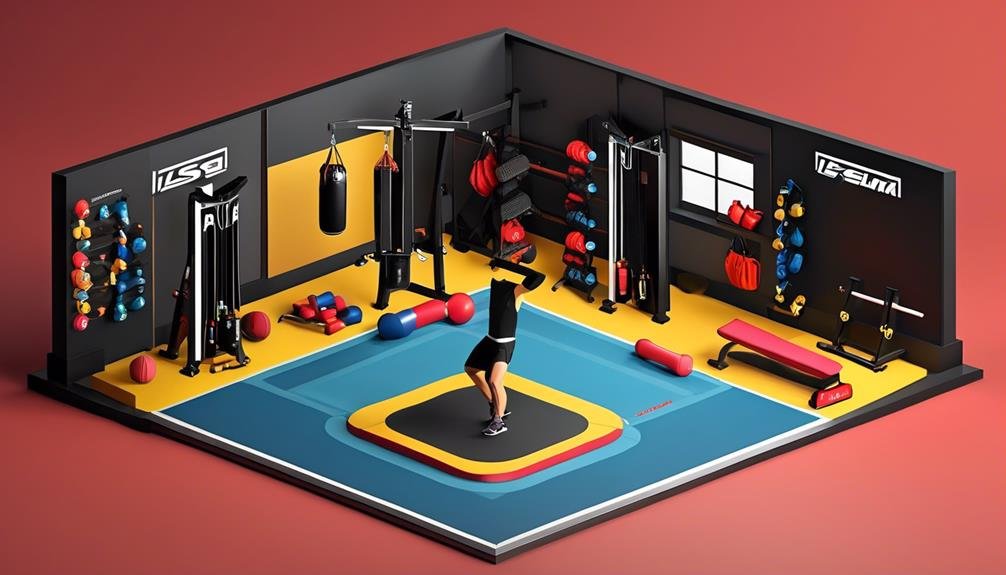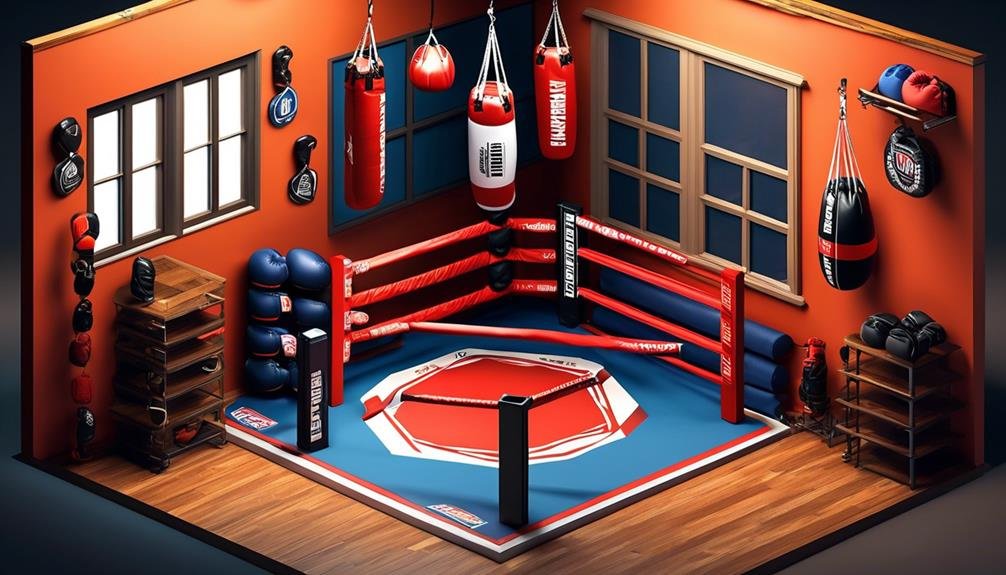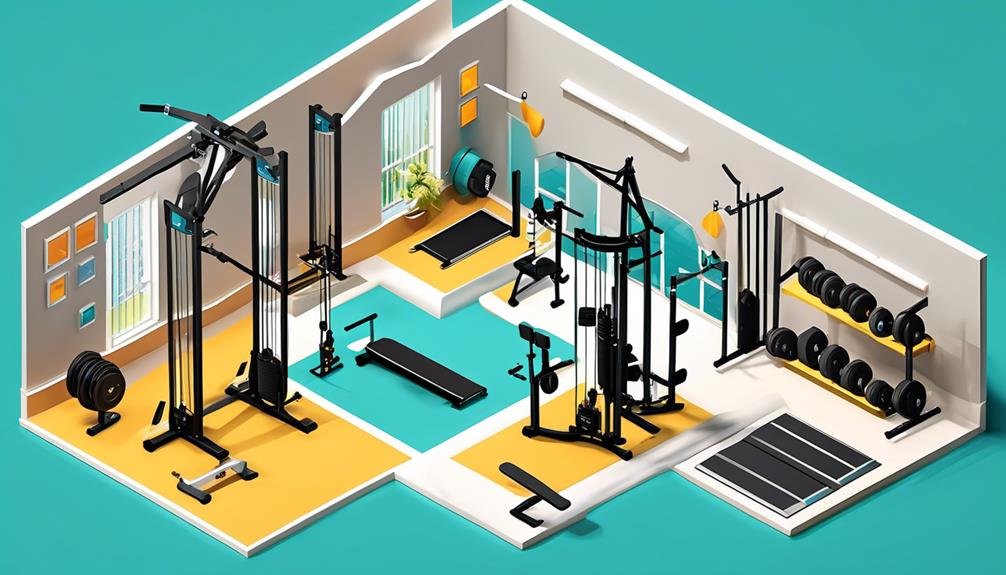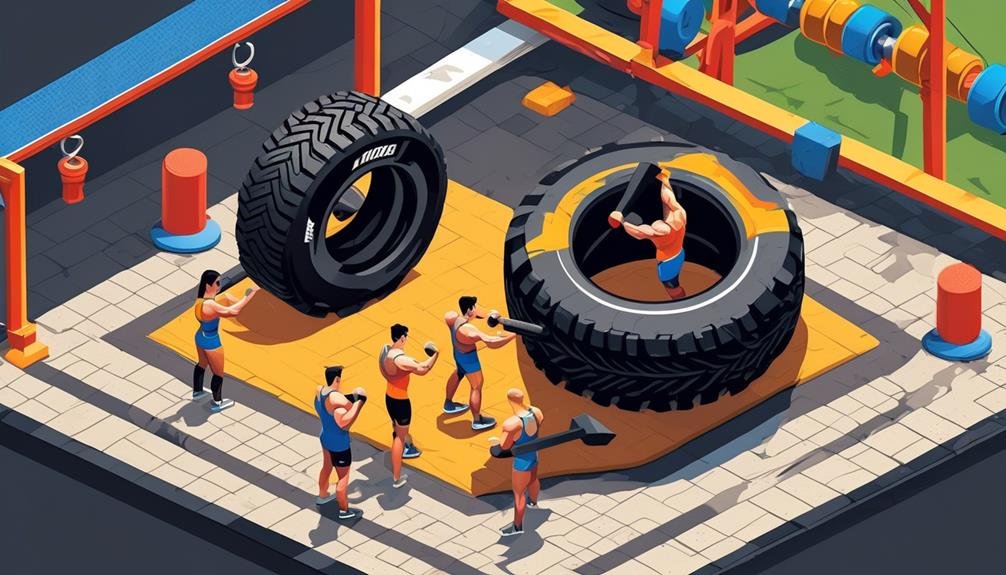Disclaimer: This content is for informational purposes only and does not replace professional medical advice, diagnosis, or treatment. Always consult a qualified healthcare provider before beginning any new exercise program.
Did you know that the global boxing equipment market is projected to reach a value of $2.6 billion by 2026? With such a significant growth in the industry, it's no wonder that many individuals are considering investing in boxing equipment for their home workouts.
If you're wondering whether to go for a heavy bag or a speed bag, there are several factors to consider. Both options offer unique benefits and cater to different aspects of boxing training.
So, which one is the right choice for you? Let's explore the advantages of each and help you make an informed decision that aligns with your goals.
Key Takeaways
- Both heavy bags and speed bags offer a range of benefits including power development, cardio improvement, and hand-eye coordination enhancement.
- There are different types of heavy bags and speed bags available, each offering a unique experience. Consider your training goals and preferences when choosing the right bag.
- Factors to consider when investing in a bag include training goals, space and installation requirements, budget considerations, and the specific benefits each type of bag offers.
- The choice between a heavy bag and a speed bag depends on your training goals and experience level. Heavy bags are suitable for improving strength and power, while speed bags are more focused on speed and coordination. Gradually increase difficulty and speed as your skills improve.
Benefits of a Heavy Bag
Using a heavy bag for your boxing training has numerous benefits that can help improve your power, endurance, and overall conditioning.
The heavy bag, also known as a punching bag or boxing bag, is a versatile piece of equipment that can greatly enhance your training routine. One of the key benefits of using a heavy bag is its ability to develop power in your strikes. By transferring your body weight into the punch, you can generate more force and increase the effectiveness of your punches.
Additionally, the heavy bag is an excellent tool for improving your cardio, muscle endurance, and conditioning. When you engage in intense bag work, you're constantly moving, punching, and dodging, which helps to elevate your heart rate and challenge your cardiovascular system.
Moreover, using the heavy bag reinforces the soft tissues and bones in your arms, making them stronger and more resilient for heavy hitting.
Lastly, the heavy bag is also beneficial for conditioning your legs for contact. As you deliver punches and kicks to the bag, you engage your lower body muscles, helping to improve your leg strength and stability.
Benefits of a Speed Bag
The benefits of using a speed bag in your boxing training are numerous and can greatly improve your skills and overall performance. Here are three key benefits of incorporating a speed bag into your home boxing routine:
- Improved Punching Speed:
The speed bag teaches you how to maintain relaxation while punching, which helps to increase your punching speed. By practicing with the speed bag regularly, you can develop the ability to throw quick and snappy punches with precision.
- Enhanced Hand-Eye Coordination and Precision:
Working with the speed bag requires constant focus and coordination between your hands and eyes. As you strike the bag, you must time your punches accurately, improving your hand-eye coordination and precision in boxing.
- Increased Shoulder Endurance and Stamina:
The repetitive motion of hitting the speed bag helps to build shoulder endurance and overall stamina. It strengthens the muscles in your shoulders, arms, and core, allowing you to throw more punches without getting fatigued.
Incorporating a speed bag into your home boxing training can enhance your rhythm and timing skills, foster a quick and accurate punch release, and provide a challenging and engaging workout. It's a valuable tool for improving your boxing technique and overall performance in the comfort of your own home.
Types of Heavy Bags

To further expand your home boxing training, let's explore the various types of heavy bags available for you to incorporate into your routine.
When it comes to heavy bags, there are a few different types to consider.
The most common type is the traditional hanging bag. These bags can vary in weight, ranging from 70 lbs. to 300 lbs. They're versatile and suitable for a range of martial arts styles, including boxing, kickboxing, Muay Thai, taekwondo, and karate. Hanging bags allow you to practice various punches and kicks, improving your technique and power.
Another option is the free-standing punching bag. These bags utilize a heavy base, eliminating the need for mounting. This makes them ideal for home gyms and kicking martial arts styles. Free-standing bags are easier to move around and can be a great choice if you have limited space.
When it comes to the shapes of heavy bags, there are several options. Uppercut bags are specifically designed to practice uppercut punches, while teardrop-shaped heavy bags allow for a variety of strikes. Angled heavy bags provide a unique angle for practicing hooks and crosses, while wrecking ball heavy bags simulate the movement of an opponent. Lastly, water-filled bags offer a more realistic feel and absorb impact better.
Each type of heavy bag has its pros and cons. Consider your training goals, available space, and budget when choosing the right heavy bag for your home boxing setup.
Types of Speed Bags
When it comes to speed bags, there are several types to choose from for your home boxing training. Each type offers its own unique benefits and challenges, so it's important to consider your specific needs and goals before making a decision.
Here are some of the most common types of speed bags:
- Swivel-mounted speed bags: These are the most traditional type of speed bags and are mounted on a swivel, allowing for quick and unpredictable movements. They're great for improving hand-eye coordination and reflexes.
- Platform-mounted speed bags: These speed bags are mounted on a platform, providing a stable base for training. They're ideal for beginners or those who prefer a more controlled and predictable workout.
- Double-end speed bags: As the name suggests, these speed bags are attached to both the ceiling and the floor with elastic cords. They offer a dynamic and challenging workout, as they require quick reflexes and coordination to keep the bag moving.
Each type of speed bag offers a different experience and can help you improve specific skills in your boxing or martial arts training. Consider your goals and preferences to choose the right speed bag for your home workouts.
Choosing the Right Bag for Your Workout

Consider your specific training goals, experience level, and available space to make an informed decision between a heavy bag and speed bag for your home boxing workouts.
If you want to enhance punching power, work on technique, and build overall body strength, investing in a heavy bag is ideal. Heavy bags come in various sizes and weights, so it's important to choose one that aligns with your training needs and body weight for effective workouts.
On the other hand, if improving punching speed, timing, and cardiovascular endurance is your main focus, a speed bag would be a suitable choice.
When choosing the right bag for your workout, it's crucial to also consider factors such as space, installation requirements, and budget.
Heavy bags typically require more space and a sturdy mounting system, while speed bags can be hung from a platform or a wall-mounted bracket. Additionally, heavy bags tend to be more expensive than speed bags.
Factors to Consider When Investing in a Bag
Evaluate your training goals, available space, and budget to make an informed decision when investing in a boxing bag. Consider the following factors before choosing between heavy bags and speed bags for your home boxing workouts:
- Training Goals: Determine whether you want to focus on building strength and power or improving speed and coordination. Heavy bags are ideal for developing punching power and enhancing overall strength. On the other hand, speed bags are great for honing your hand-eye coordination, rhythm, and timing.
- Space and Installation: Assess the space available in your home and consider whether you can install a hanging bag or if you need a freestanding option. Heavy bags usually require a sturdy mount, while speed bags can be mounted on a wall or installed on a stand.
- Budget: Take into account the cost of the bag itself and any additional equipment required. Heavy bags tend to be more expensive, especially if you need a mount or stand. Speed bags are generally more affordable and require minimal additional equipment.
Conclusion: Making the Right Choice for Your Boxing Training

To make the right choice for your boxing training, carefully assess your training goals, experience levels, and the quality of the punching bag. Consider whether you want to focus on improving punching and kicking skills or enhancing speed, strength, and endurance. If you are a beginner or looking to improve your technique and power, a heavy bag would be the better option. On the other hand, if you are more experienced and want to work on your speed and reflexes, a speed bag would be more suitable.
Here is a table that summarizes the key points to consider when choosing between a heavy bag and a speed bag:
| Heavy Bag | Speed Bag |
|---|---|
| Improves punching and kicking skills | Enhances speed, strength, and endurance |
| Provides resistance for building power | Develops hand-eye coordination and rhythm |
| Helps improve technique and accuracy | Increases reflexes and agility |
| Suitable for beginners and experienced boxers | More suitable for experienced boxers |
| Requires more space and stability | Requires less space and stability |
Frequently Asked Questions
Can You Get Good at Boxing With Just a Heavy Bag?
Yes, you can become skilled in boxing by training with just a heavy bag. It helps develop power, improves cardio, endurance, and conditioning, while reinforcing arm strength. However, using both heavy and speed bags offers a more well-rounded training experience.
Does Speed Bag Make You a Better Boxer?
Using a speed bag can make you a better boxer by improving your punching speed, hand-eye coordination, accuracy, and cardiovascular endurance. It also enhances rhythm, timing, and overall stamina in boxing.
Should I Get a Heavier or Lighter Punching Bag?
You should consider your training goals and experience level when deciding whether to invest in a heavier or lighter punching bag. A heavier bag can develop power, while a lighter one enhances speed and technique.
Is It OK to Hit the Heavy Bag Everyday?
Hitting the heavy bag every day is okay, but it's crucial to maintain proper technique and seek guidance. It can improve your boxing skills, build endurance, and engage multiple muscle groups for a full-body workout.
Conclusion
In conclusion, when deciding between a heavy bag and a speed bag for boxing at home, it's important to consider your training goals and preferences.
If you want to focus on developing power, stamina, and overall boxing skills, a heavy bag is the way to go.
However, if you want to improve speed, accuracy, and hand-eye coordination, a speed bag is the better option.
Choose the bag that aligns with your specific training needs to maximize your boxing workouts.



